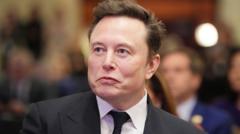
Elon Musk has escalated his legal battle with OpenAI by filing an amended lawsuit that now includes Microsoft as a defendant. The lawsuit, filed in a California court, accuses OpenAI and Microsoft of operating a monopoly in the artificial intelligence sector and transforming from a non-profit organization to a profit-driven entity.
Originally founded in 2015, OpenAI’s initial mission was to develop artificial general intelligence (AGI) – an AI capable of performing any task a human can do. In 2019, the company introduced a “capped profit” structure to raise funds, which led to a significant investment from Microsoft. The tech giant initially invested $1 billion and later expanded to a multi-year, multi-billion dollar partnership.
Musk, a co-founder of OpenAI, claims the company has deviated from its original principles. The lawsuit alleges that OpenAI has transformed from a “tax-exempt charity to a $157 billion for-profit, market-paralysing gorgon.” He argues that Microsoft and OpenAI have used their market position to eliminate competitors, including his own AI company, xAI.
The legal complaint also targets OpenAI’s CEO Sam Altman, accusing him of “rampant self-dealing.” Additionally, LinkedIn co-founder Reid Hoffman has been added as a defendant in this latest version of the lawsuit.
OpenAI has strongly rejected Musk’s claims, calling the lawsuit “baseless” and “overreaching.” A company spokesperson stated that this is Musk’s third attempt in less than a year to reframe his allegations. They point to previously published emails that they believe demonstrate the inconsistency of Musk’s arguments.
The company maintains that Musk himself had previously supported the idea of a for-profit structure. In a blog post, OpenAI suggested that Musk had once sought “absolute control” of the company.
This legal action comes at an interesting time, coinciding with the week that former President Donald Trump has reportedly considered Musk for a government role focused on cost-cutting and bureaucracy reduction.
The lawsuit claims that as a result of their actions, the defendants have been “unjustly enriched to the tune of hundreds of billions of dollars in value,” while Musk and the public have been “conned.”
Microsoft has declined to comment on the ongoing legal dispute. The case highlights the growing tensions in the AI industry, particularly around the development and commercialization of advanced artificial intelligence technologies.
Musk’s initial legal action in March argued that OpenAI had become a “closed-source de facto subsidiary” of Microsoft, a claim the company has consistently denied. This latest lawsuit represents a continued effort by Musk to challenge OpenAI’s current business model and strategic direction.








